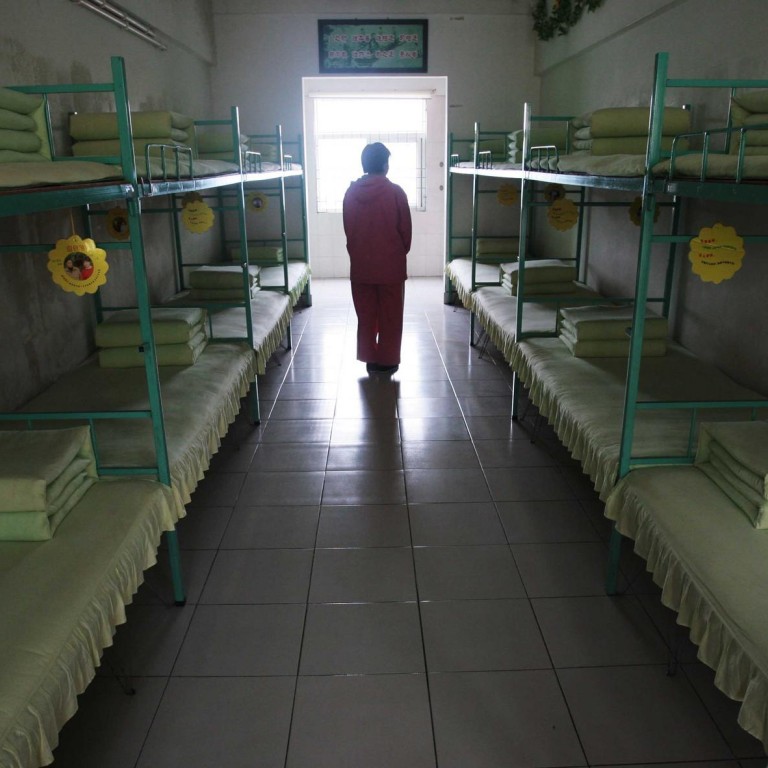
Labour camps may become a thing of a past, but what will replace them?
Beijing's promised reforms to the controversial system of 're-education through labour' raises questions of how dissent will now be handled
When Mao Hengfeng heard that the police had stopped sending people to or re-education through labour, she felt a sense of relief.
Mao, a petitioner from Shanghai, had been sentenced to three times and locked up in a mental asylum three times - one time after her seven-month fetus was forcibly aborted when she was pregnant for the third time. She attributes recurring nightmares, high blood pressure and migraines to the torture she said was inflicted on her in - including being forcibly fed urine and excrement
"If police cannot throw people into as they please, then that's an improvement," she said.
Over the past months, many authorities across the mainland have quietly stopped sending petty criminals and government critics to forced labour.
Top security chief Meng Jianzhu announced in January that the notorious system of arbitrary detention would be halted this year. In March, Premier Li Keqiang said details of the "reform" to the system would be announced before year's end.
Over the past few months, state media have reported that provinces such as Guangdong, Shandong and Yunnan had stopped approving new cases for and many centres built for that purpose had been turned into drug treatment centres. But there has been no word from the central government on whether this suspension will be permanent.
On October 23, state media reported that top judge Zhou Qiang had said courts should speed up the handling of minor offences and "co-operate in the reform of " - a move seen by legal experts as a sign that more cases involving people who would have previously been sent to would now be handled by the courts.
Since its introduction in 1957, re-education through labour has given police the power to send petty offenders - such as prostitutes, cult members and government critics - to labour camps for up to four years, without trial.
China law expert Jerome Cohen of New York University said making police go to the court to seek approval for trial would be "a significant procedural improvement" as it would remove their unfettered authority.
But legal experts say it is unclear which type of offenders would be prosecuted in court and how police would handle others previously designated for such as petitioners, activists and followers of the outlawed Falun Gong sect.
Some fear that will be replaced with a new form of punishment, and note that the police can still resort to other forms of arbitrary detention amid the government's escalating drive for "stability maintenance".
"They can get rid of the name and even the institution, but police still have many options for informally punishing people without it," Cohen said.
Under existing law, police can hand out administrative detention of up to 15 days to people who have committed minor offences. They can also hold suspects on a charge for up to 37 days before a formal arrest, and can also give six months of "residential surveillance" to suspects in cases allegedly involving terrorism, endangering national security and serious bribery.
But what worries legal experts even more is the police tendency to use other types of detention as a convenient tool to make people disappear indefinitely - such as sending suspects to mental asylums, the so-called black jails or "law education classes".
"The difficulty is that they could be pushed into dark corners which are invisible," said law professor Fu Hualing at the University of Hong Kong.
"I'm concerned that if there was a political need [to maintain stability] before [this reform], there must be the same need now and that hasn't changed."
Fu said the key to ending abuses was for the police to be held accountable to the courts and the legal system to be independent from political influence - and that required political change.
A new book, by Cohen and Professor Margaret Lewis, shows how Taiwan's constitutional court and other branches of government, since the end of martial law in the late 1980s, gradually precipitated the abolition of the island's equivalent of in 2009.
This would be difficult to replicate on the mainland now, Cohen said, given that the new leadership appears to be overseeing an even more repressive system than before, yet it still must show "it is not totally unresponsive to increasing demands from the public".
Last month, when lawyer Tang Jitian travelled to Jixi , Heilongjiang in search of his client's wife, a detained Falun Gong follower, he found she was locked up in a so-called law education centre that was situated inside a re-education-through-labour camp.
"People who get sent there simply vanish," Tang said. " will continue to survive under different names - and will be more invisible, too."
Legal scholar Teng Biao , who himself has been "disappeared" by police several times, also believes the answer to ending abuses is the elimination not just of , but of all forms of arbitrary detention.
"As long as there is no independent judiciary, it will still be a police state," Teng said.
Meanwhile, Mao the petitioner said her friends who would have been sent to before are now given administrative or criminal detention.
"Authorities are just putting old wine in new bottles," she said.
An earlier version of the story quoted law expert Jerome Cohen in the 9th paragraph as saying "making police attend court for trial would be 'a significant procedural improvement'". It should be "making police go to the court to seek approval for trial would be 'a significant procedural improvement'".

